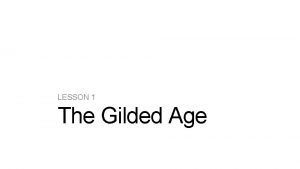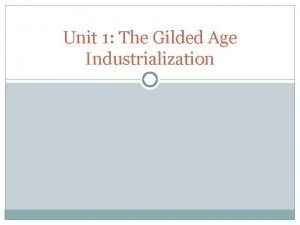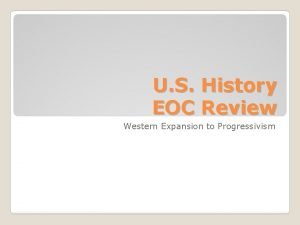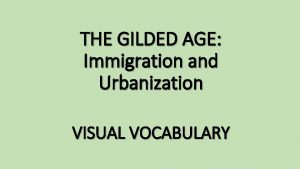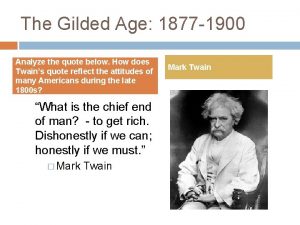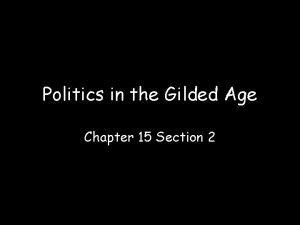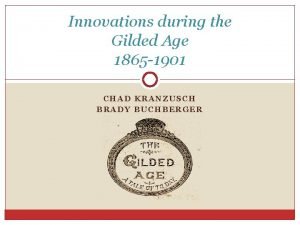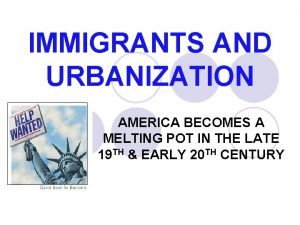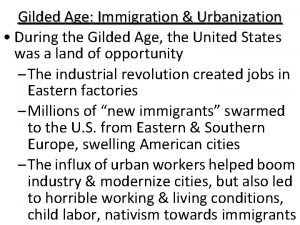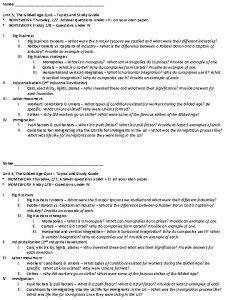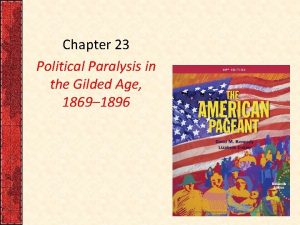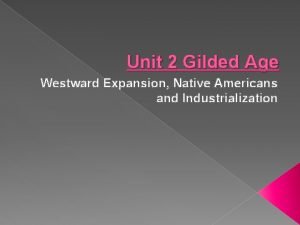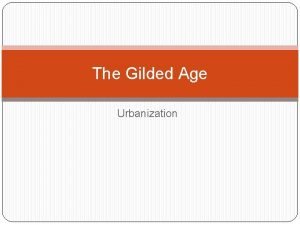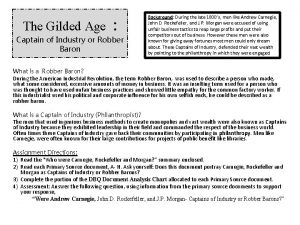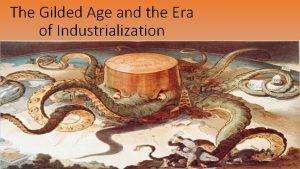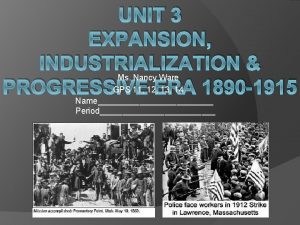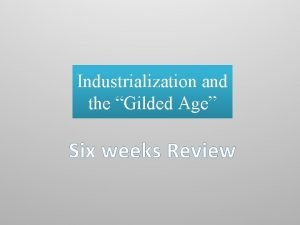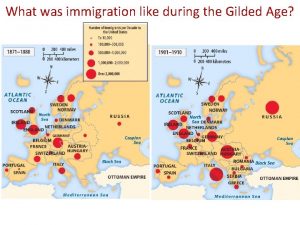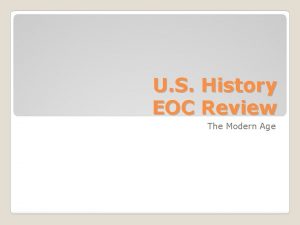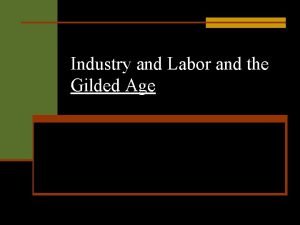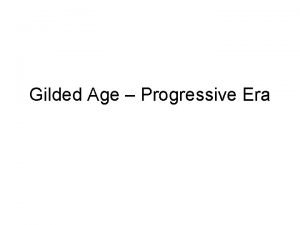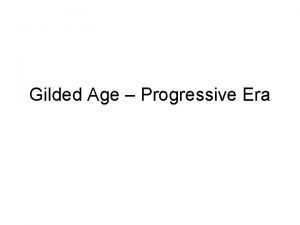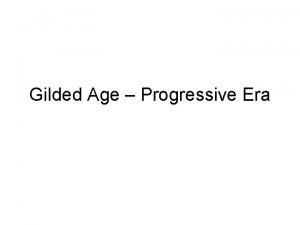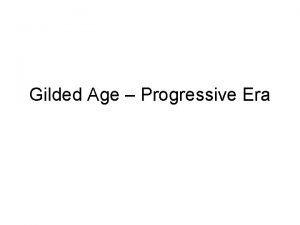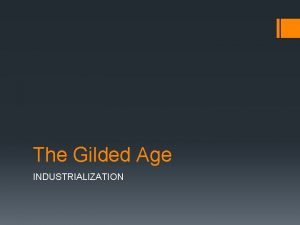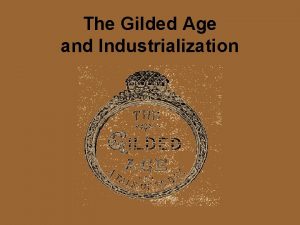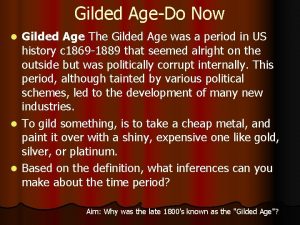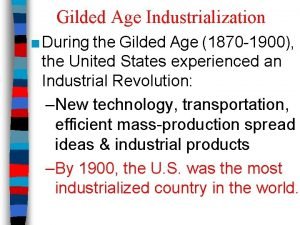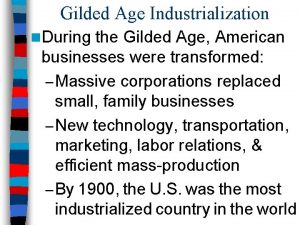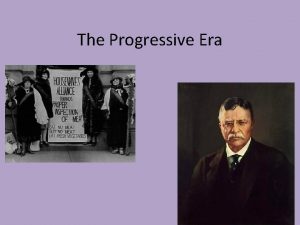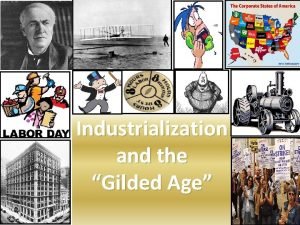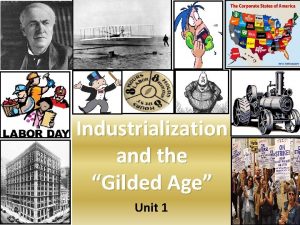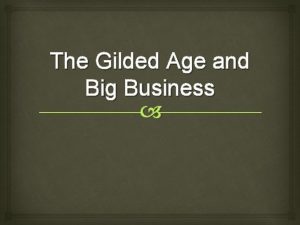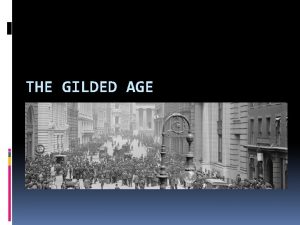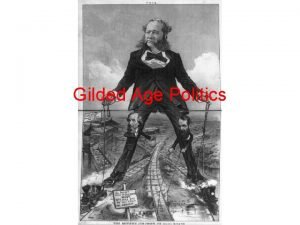The Gilded Age and the Era of Industrialization


































- Slides: 34

The Gilded Age and the Era of Industrialization

Vertical Integration • Very important business practice that develops in the mid 1800’s • As companies start to grow bigger and bigger, one of their goals is to control as much of the creation and distribution of their product as possible. • If you are in the oil business it looks like this: You want to own the land the oil is underneath You want to own the drill taking the oil out of the ground You want to own the railroad that takes the oil to the refinery You want to own the refinery You wan to own the gas stations or distribution outlets. • This leads to increased profits and a larger company



Horizontal Integration • Another very important business practice that becomes common in the mid 1800’s • This is all about buying out your competition • One goal of business is to control as much of the “market” as they can. The more competition, the smaller share of the market you control. • As companies grow bigger, then start buying up their smaller competitors to eliminate the competition. • The more companies you buy up, the more control of the market you have. • This can lead to monopolies.

• https: //www. titlemax. com/discovery-center/moneyfinance/companies-disney-owns-worldwide/

Monopoly • When a company has basically no competition and they have grown so big that they are basically the only ones doing what they are doing. • Small companies can’t even get started and could never compete with monopolies. • In this era of industrial growth, many of these big businesses will grow into monopolies. • Our federal government will start to go after some of them in the late 1800’s and declare them illegal. Some monopolies will be allowed to stay. • Pacific Gas and Electric is an example of a modern monopoly.





Extractive Industry • A business based on harvesting raw materials used in industrialization. • Oil extraction, timber harvesting, coal mining, etc • Technology and new machinery has enabled these types of industries to be more efficient and process more raw materials than before. • These industries are a major part of industrialization and allow progress to occur and our standard of living to rise. • This progress and increased standard of living comes at a price. These types of industries are very damaging to the physical landscape and in many cases, the health of people and wildlife. • In this era, business in basically unregulated. No pollution laws, no laws about clear cutting forests, etc.

De-Skilling of Labor • The process of taking a complex task and breaking down into simple and repetitive tasks. • This is a major change from the way that we used to manufacture things. We used t have skilled craftsmen make items from start to finish. • Many people worked for themselves as independent craftsmen. • In this era, we shift away from having skilled craftsmen creating things and instead rely on unskilled labor doing repetitive tasks in a factory. • If I have unskilled immigrants who can’t speak English, I need to be able to quickly train and replace them if needed. De-skilled tasks make that possible.

Industrial Era and Product Regulations • What goes into the products you eat and put into your body? • Do you know what companies are putting in them? • Should the government regulate what companies put in their products?



Muckraking • A term given to journalists and writers during this era of Industrialization who write about the possible negatives caused by Industrialization. • The term means to “Stir or rake up the muck” • It means to go into shit and stir it up in ways that sometimes makes people uncomfortable or upset. • These muckrakers write about everything from unfair business practices and monopolies, to factory working conditions, to child labor, to environmental damage. • Their writings appear in popular novels, magazines, and newspapers.


The Jungle • Famous book written by Upton Sinclair in 1906. • In this era of industrialization, mass food production has become a factory process with no regulations. • Conditions are unsanitary and the food products are often tainted with rotten meat, rat poop, human blood and sweat, and a host of unseen germs and bacteria. People get sick from this and in some cases die. • The working conditions are also unsafe for the people who work in these places. • This book “The Jungle” highlights the conditions or the workers and the food products.


What is a Labor Union? • A Labor Union is an organization of workers who act as one voice when dealing with the management. • The purpose of a labor union is to help workers gain better wages, benefits, and improve their working conditions. • Typically a Union will negotiate a contract for all workers so no one is left out. • Managers and Businesses typically don’t like labor unions. They make their job more difficult and they make running a business more expensive. • It costs money to pay your workers a decent wage and make factories safe for them. It costs you money to shorten their work day and give them breaks etc.

• What viewpoint is being expressed in the cartoon?

Labor Unions • • Labor Unions try and advocate for : Higher wages Shorter working hours Safety Precautions in factories Workers Compensation Insurance (in case of injury) Old Age Pensions Member of Union pay membership dues and the Union uses that money to operate.


Labor Unions • Some Labor Unions discriminate and are white only (Closed Shop) • Some Unions only organize one type of worker and won’t include unskilled workers or women. • Other Unions will organize any workers in any type of industry (Open Shop) • Some Labor Unions are very politically powerful and if you want to win elected office, you need to have the support of the Labor Unions. • In California today, it is basically impossible to win elected office without the support of the teachers union (California Federation of Teachers)

Labor Unions • Labor Unions typically take one of two approaches: • They either have the goal of overturning the current system, or they just want to get a gibber piece of the economic pie for their workers. • Some Unions will advocate violence and overthrowing the capitalist system. (Very few Unions) • Others will try to use strategies like strikes and collective barraging to improve their situation. (Most Unions)

Labor Unions • People who dislike Labor Unions try to associate them with dangerous and radical politics • They associate Unions with left wing politics like Communism and Socialism • They associate Unions with immigrants. • They view Unions as a dangerous threat to personal property.

Homestead Strike • What was the strike? • How did it play out? • Who were the winners and losers of the strike?

Homestead Strike


Chinese Exclusion Act (1882) • When gold is discovered in California in 1848, tens of thousands of Chinese men come to California to work in the gold fields. • The Chinese arrive in the very crowded gold fields and immediately face intimidation, a mining tax that no one else had to pay, rules preventing them from mining in certain areas, and violence. • Many more Chinses will arrive in the 1860’s to work on the Transcontinental Railroad. • Bad economic conditions and racism will result in a huge amount of anti-Chinese anger amongst Californians.

Chinese Exclusion Act (1882) • By 1880, there are over 110, 00 Chinese people living in America. The Chinses Exclusion Act is a law the bans basically all Chinese people from coming into the United States. • It also says that the Chinese who are already in the US cannot become citizens and are not entitled to the rights of citizens. • It is the first time we have had an immigration law that targets a specific group by name. Chinese people will be required to carry a passport on them at all times. • In the years following the passage of this law, there will be many race riots and other acts of violence against the Chinese. The entire Chinese populations of major cities like Tacoma, WA are expelled. • The law will be in effect for over 50 years.


 Lesson 1 - politics and the gilded age
Lesson 1 - politics and the gilded age Gilded age cause and effect
Gilded age cause and effect Iron age bronze age stone age timeline
Iron age bronze age stone age timeline Iron age bronze age stone age timeline
Iron age bronze age stone age timeline Standard oil monopoly
Standard oil monopoly Gilded age eoc blitz review
Gilded age eoc blitz review The gilded age vocabulary
The gilded age vocabulary Gilded age mark twain quote
Gilded age mark twain quote What does gilded age mean
What does gilded age mean Chapter 15 section 3 politics in the gilded age
Chapter 15 section 3 politics in the gilded age Gilded age innovations
Gilded age innovations The gilded age medvirkende
The gilded age medvirkende Melting pot gilded age
Melting pot gilded age Urbanization during the gilded age
Urbanization during the gilded age Presidents during gilded age
Presidents during gilded age Gilded age
Gilded age Chapter 23: political paralysis in the gilded age
Chapter 23: political paralysis in the gilded age Gilded age apush review
Gilded age apush review Gilded age graphic organizer
Gilded age graphic organizer The gilded age quiz
The gilded age quiz Gilded age gallery walk
Gilded age gallery walk Chapter 23 political paralysis in the gilded age
Chapter 23 political paralysis in the gilded age Gilded age acrostic poem
Gilded age acrostic poem Urbanization political cartoon
Urbanization political cartoon Captains of industry
Captains of industry Vertical integration gilded age
Vertical integration gilded age Chapter 7 section 3 politics in the gilded age
Chapter 7 section 3 politics in the gilded age Fahrenheit 451 literary devices with page numbers
Fahrenheit 451 literary devices with page numbers Promontory point gilded age definition
Promontory point gilded age definition Name 2 famous entrepreneurs of the gilded age
Name 2 famous entrepreneurs of the gilded age Gilded age
Gilded age Gilded age labor strikes
Gilded age labor strikes The gilded age 1877 to 1898 worksheet answers
The gilded age 1877 to 1898 worksheet answers Gilded age eoc blitz review
Gilded age eoc blitz review Gilded age
Gilded age
